In a conflict with North Korea, the South has much more to lose
The DPRK cares little about dead soldiers, but there will be nationwide outrage in ROK if tensions turn to skirmishes
Andrei Lankov January 12, 2023
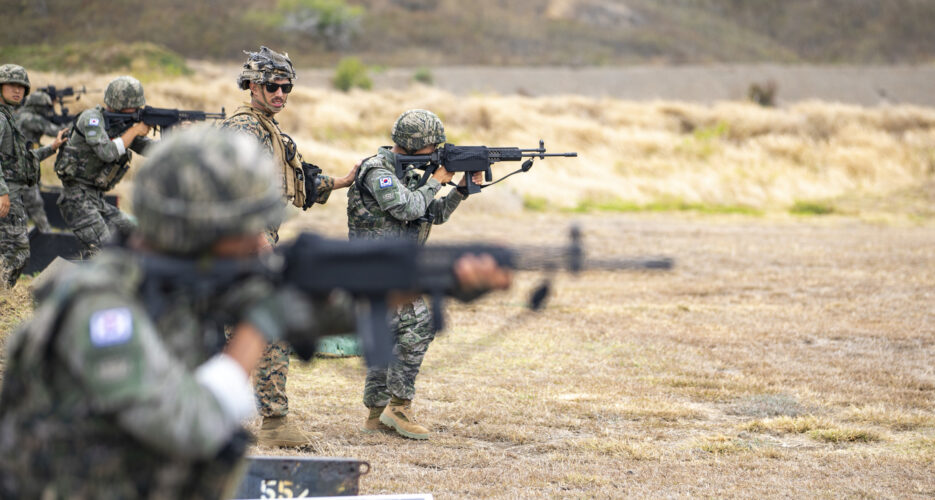
SHARE
ROK soldiers participate in live-fire training at the U.S. Marine Corps Base in Hawaii on July 18, 2022 | Image: U.S. Navy photo
In the last few weeks, relations between Seoul and Pyongyang have witnessed what can be described as a satellite and drone war — somewhat comical, perhaps, but indicative of the potentially explosive problems in inter-Korean relations.
The story began when the North Koreans launched a spy satellite prototype and then, to prove they really did what they claimed, released high-altitude photos of Seoul and Incheon.
The South Korean side dismissed the reconnaissance effort as low quality and useless. Clearly outraged, the North Koreans reacted by sending surveillance drones over the border and into Seoul airspace. The ROK military then sent its own unmanned aerial vehicle (UAV) across the inter-Korean border and test-launched a spy satellite of its own.
This all might sound like a pissing contest, but this is the typical picture of how the Koreas interact these days. The South Koreans were only recently engaged in joint air, land and naval maneuvers while North Koreans were shooting missiles as a reply. Now both sides are ready to increase the level of tension at the first sign of provocation, lest they appear weak to the other side.
The problem for Seoul is that, if the faceoff with the North turns violent, it has far more to lose.
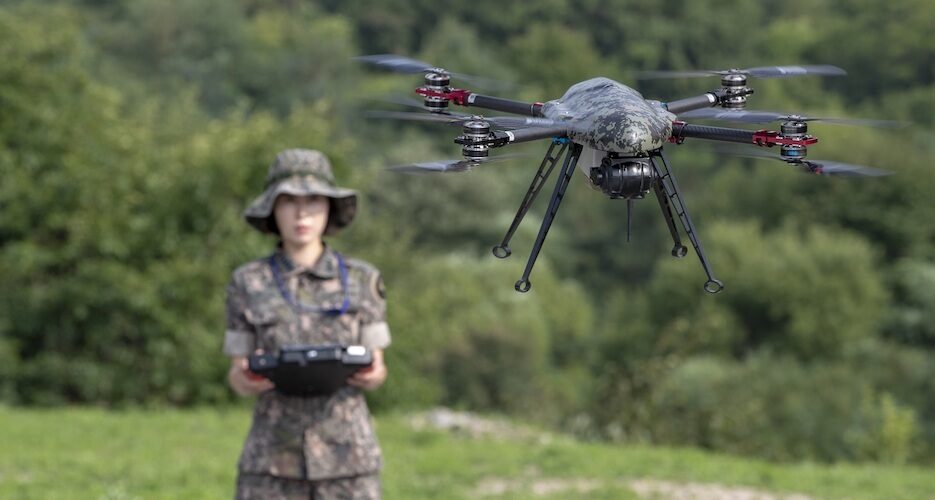 ROK Army officer participating in training using military drones | Image: ROK Army (Jan. 2019)
ROK Army officer participating in training using military drones | Image: ROK Army (Jan. 2019)PLAYING TOUGH
When it comes to dealing with the northern neighbor, the battle cry of South Korea’s ruling conservatives is clear: tit-for-tat! North Korea obviously feels the same.
This uncompromising position reflects the world vision of President Yoon Suk-yeol and his advisers. The South Korean political right is generally correct in their appraisal of the inter-Korean situation, but the conclusions they draw from it are deeply flawed and even plain dangerous.
The incumbent right sees engagement with the Kim regime as a failed experiment. Yoon’s “audacious” plan to restart diplomacy with the DPRK is intentionally predicated on what Seoul knows is a nonstarter: “meaningful steps toward denuclearization.” Kim Jong Un will not disarm and the Yoon administration knows this, meaning Seoul does not actually want engagement with Pyongyang.
ROK conservatives understand correctly that, no matter what the left claims, there has never been reciprocity in relations with the North: South Korean taxpayers always paid for what was pompously called inter-Korean cooperation.
They also assume that the significant unilateral profits the North Korean side has made from these subsidized exchanges have been largely spent on strengthening illiberalism and military capabilities, so the ROK budget was paying to make its most dangerous enemy even more dangerous.
They have thus come to the conclusion that they should be as hardline as possible. In a sense, their attitude is best expressed by the DPRK propaganda slogan “Let’s revenge the enemy one hundredfold, one thousandfold!” The ROK conservatives do not want to deal with the North, and they are ready to use force to counter any North Korean provocations.
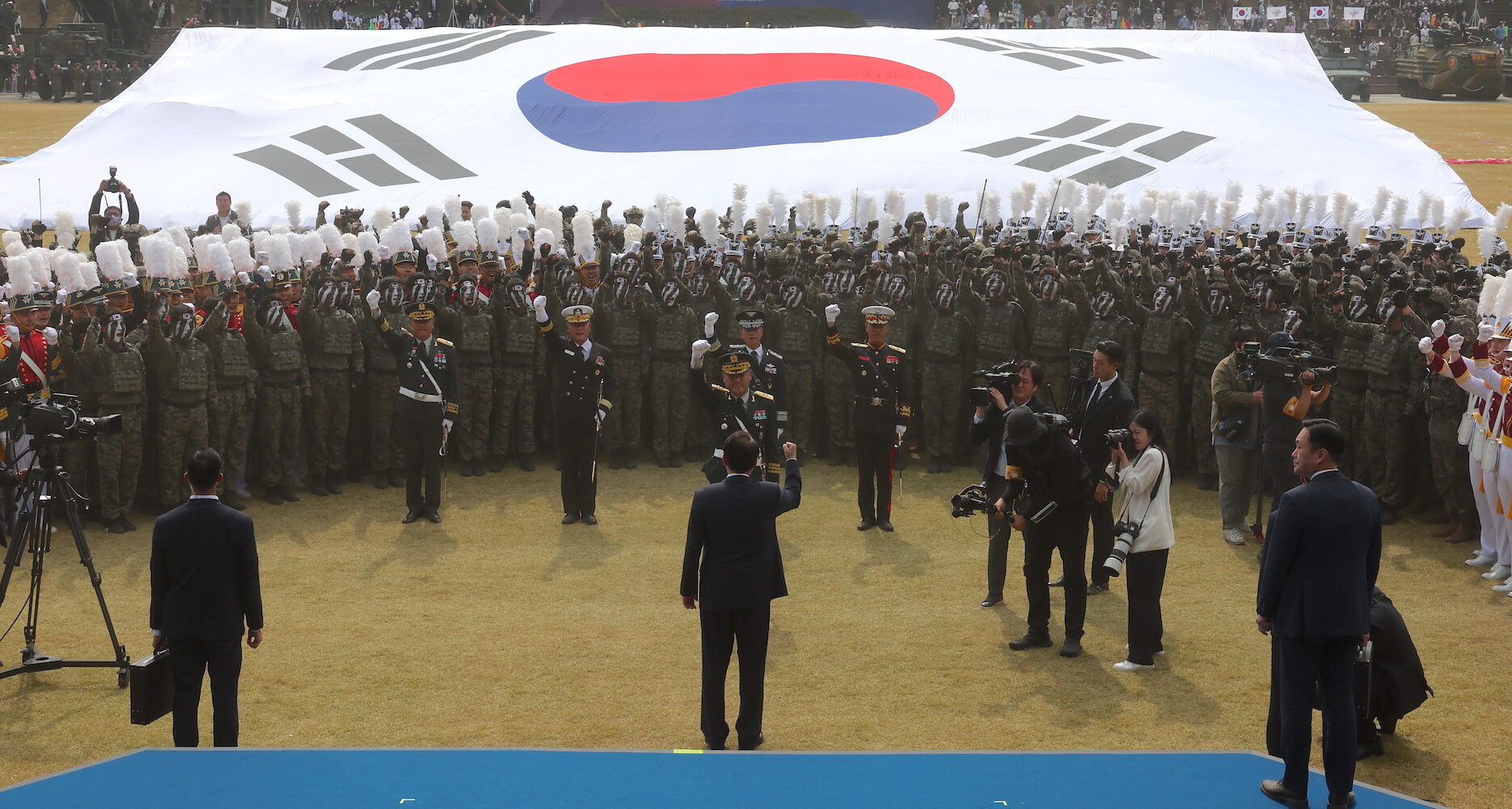 South Korea President Yoon Suk-yeol at a military event on Oct. 1, 2022 | Image: ROK Presidential Office
South Korea President Yoon Suk-yeol at a military event on Oct. 1, 2022 | Image: ROK Presidential OfficeASYMMETRIC RELATIONSHIP
Ignoring the North except to respond militarily to missile and other weapons tests might look good on paper, but it has a serious flaw: The political vulnerability of the North and South is deeply asymmetrical.
While the North’s infrastructure and conventional capabilities are of course vulnerable from the much stronger South’s perspective, when it comes to matters of politics and public opinion, it is the South that faces much greater risks.
Thus there are good reasons to believe that we are heading toward a major clash at the inter-Korean border. It might happen merely as a result of a mistake or poor signaling; yet another show of force might go wrong, triggering a real exchange of fire and escalation.
It is well within the realm of possibility that North Korea will send more drones over Seoul, or even attack another ROK vessel or shell a ROK island as it did in 2010 with the ROKS Cheonan and Yeonpyeong island. They might not even try to deny any of it, instead calling it a necessary response to Seoul’s “aggression” and “hostile policy.”
Would South Korea decide to fire artillery into North Korean territory? In all probability, the mismatch in conventional capabilities means that casualties and damage in the DPRK will far exceed what it does to the South. Those North Koreans who are likely to be killed, in dozens or even in hundreds, will be rank-and-file Korean People’s Army soldiers — cannon fodder who matter little in the calculations of Pyongyang decision-makers.
Their families will not vote against the Kim regime or protest in the slightest, and there is no independent media to question the government’s decisions, asking who is responsible for the soldiers’ deaths. Most likely, the North will not admit any losses at all. Alternatively, these people were proclaimed to be dead heroes, victims to the evil warmongers from Washington and their Seoul stooges.
Politically, the ROK’s revenge will have no significance. Pyongyang’s elite will barely notice it.
But that’s entirely not the case in South Korea. A larger version of the Yeonpyeong island incident will influence people in dramatic ways. Some South Koreans will be confirmed in their perception of the North as an incurable hostile force, stopping at nothing. However, a significant part of ROK voters will react differently.
The opposition is already questioning the Yoon administration’s hard line, accusing it of unnecessary bellicosity.
A large-scale confrontation, especially with civilian casualties, is likely to reinforce such attacks. The opposition will have a field day, talking about how the government’s harsh stance resulted in bloodshed. For government supporters, it will be difficult to counter such statements, since the bellicosity of the current government is indeed highly visible.
The equation seems to be clear: For the North, the confrontation will cost nothing; For the South, it will inflict some political cost on the current government.
An old truism states that democracies are far more sensitive to human losses than dictatorships, and it seems that some people in Seoul are too eager to provide us with another confirmation of this well-known and well-tested fact.
Edited by Arius Derr
INTER-KOREANMILITARY AFFAIRS
RECENT STORIES
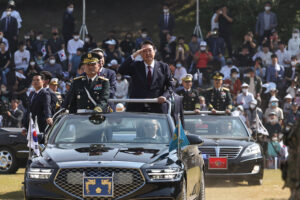
Yoon says Seoul could rapidly acquire nukes if North Korean threats increase
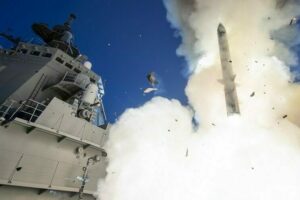
US backs Japan’s push for counterstrike capabilities to counter North Korea
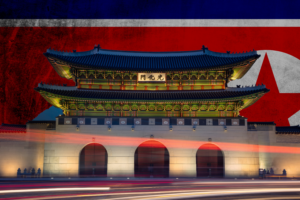
ROK investigating progressive groups for establishing pro-North Korea spy cells
About the Author

Andrei Lankov
Andrei Lankov is a Director at NK News and writes exclusively for the site as one of the world's leading authorities on North Korea. A graduate of Leningrad State University, he attended Pyongyang's Kim Il Sung University from 1984-5 - an experience you can read about here. In addition to his writing, he is also a Professor at Kookmin University.
No comments:
Post a Comment